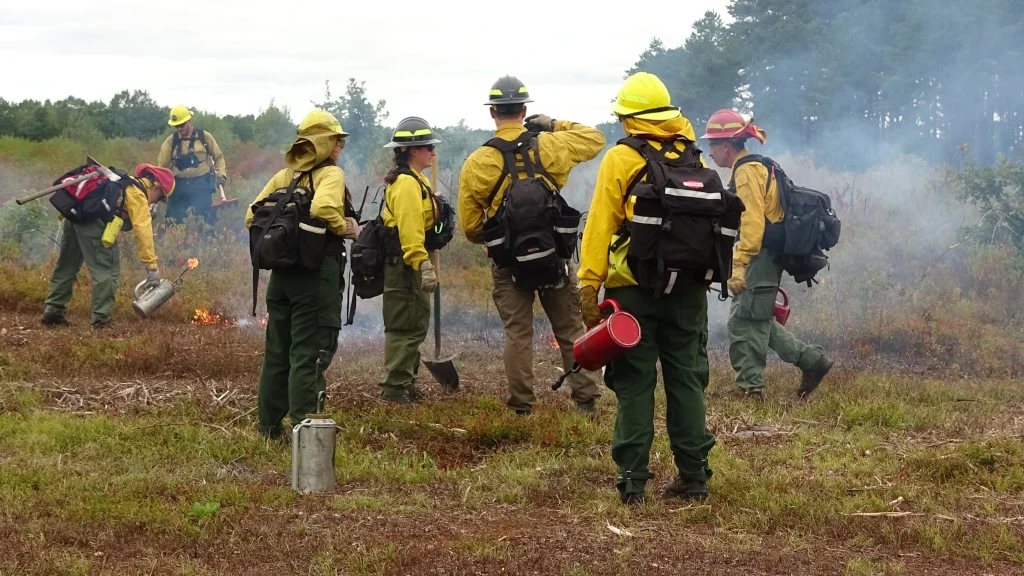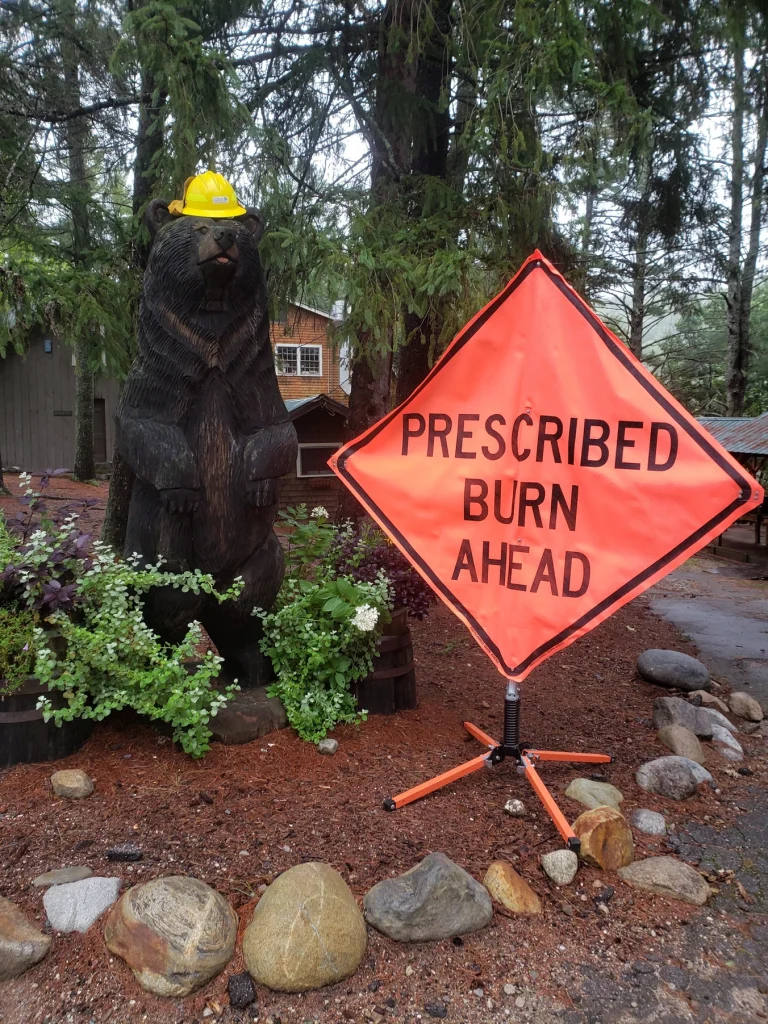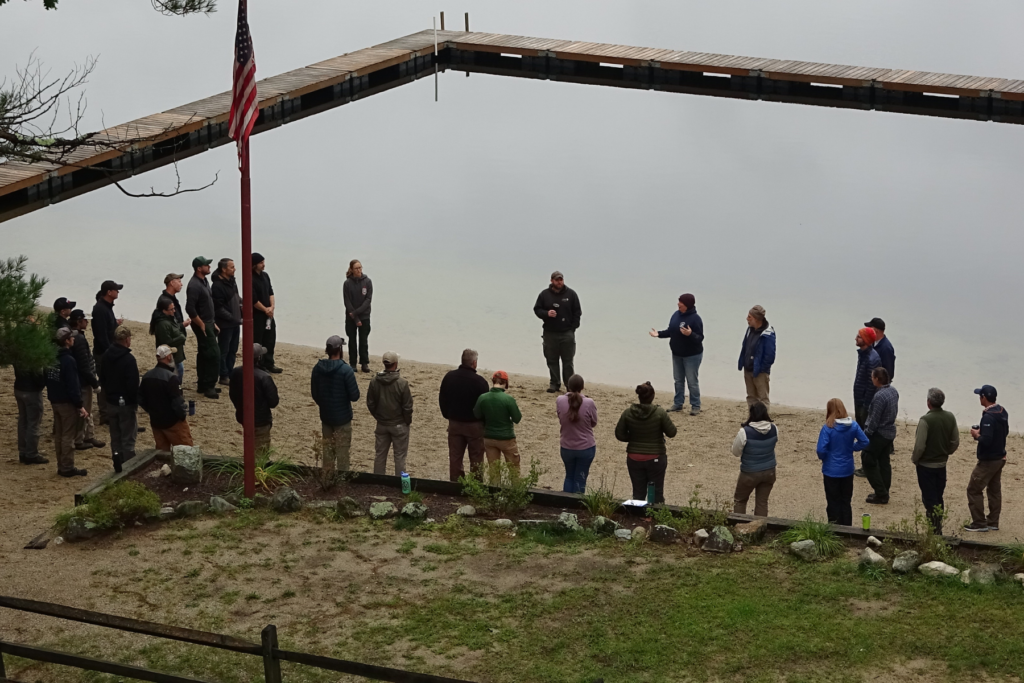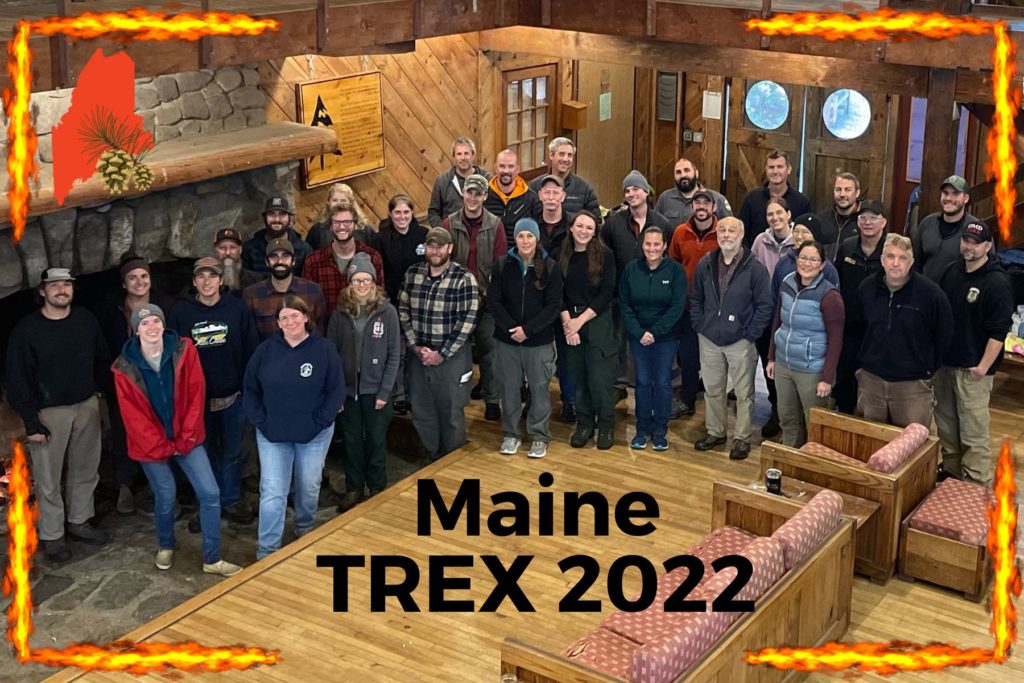Maine TREX 2022

A group of Maine TREX participants examine fresh fire effects at Wells Barrens.
Written by Amanda Mahaffey
September is traditionally a promising time for fall burning in southern Maine. The fall of 2022 brought more rain than one would want for prescribed fire, but not enough to dampen the mood for over 30 participants and training leaders who gathered for the long-awaited ME-TREX. A TREX, or prescribed fire training exchange, is a training event conceived of by The Nature Conservancy to advance the pace and scale of prescribed fire across the landscape. The 2022 ME-TREX was the first of its kind in the Northeast. Like other TREXs, the ME-TREX brought its own flavor to the TREX “recipe” of training, treatment, and outreach. The two-week event was intended to accomplish ecological burning and reduce hazardous fuels. Through this work, participants would grow their fireline qualifications and experience. The story of the impact of this work on the landscape would be amplified through purposeful outreach within and beyond the fire community.

The local camp bear took safety precautions by donning a hardhat and posting “Prescribed Burn Ahead” signage
The planning, which had begun prior to the coronavirus pandemic, was led by a core team of Maine Prescribed Fire Council leaders representing The Nature Conservancy’s (TNC) Maine Chapter, The Maine Forest Service, the Maine Army National Guard, and the Forest Stewards Guild. As September approached, this team was augmented into the ME-TREX Incident Management Team (IMT) with help from ESRI, the U.S. Fish and Wildlife Service, and the Oregon Military Department. In addition to these agencies, the TREX was also made possible by key support from the Northeastern Forest Fire Protection Compact (NFFPC), the North Atlantic Fire Science Exchange (NAFSE), and TNC’s Fire Learning Network. The Maine Teen Camp in Porter was our base of operations, and a welcome home-away-from-home during the training event.
Travelers came from Oregon, Wisconsin, Florida, Georgia, Maryland, Virginia, West Virginia, Pennsylvania, Rhode Island, New Hampshire, Maine, New York, Vermont, and Nova Scotia. Our participants represented a variety of state and federal agencies, TNC chapters, stewardship organizations, and universities. While it rained outside, the participants and IMT went through check-in and orientation to Maine’s fire landscape and the variety of wildland fire engines and UTVs. Icebreaker activities helped build group cohesion. The fireplace, which was the only source of heat in the camp, became the centerpoint of social activities over the next two weeks.

Participants gathered lakeside for some icebreakers and to begin learning about one another.
Morning briefings featured a variety of voices on weather, safety, incident objectives, operations, and logistics. While the fuels dried outdoors, we learned about fire-related topics in Maine including pine barrens ecology, fire weather tools by the National Weather Service, Indigenous blueberry burning, Maine’s fire history, gender dynamics in fire, and the work of TNC in Maine. We also practiced Firewise assessments and mock-media interviews, toured the Maine Forest Service’s Mobile Command Vehicle, and ran SimTable exercises. Later in the program, our group was joined by legendary figures in fire science and management from the Northeast, including Dave Crary (retired from Cape Cod National Seashore), Tim Simmons (retired from MassWildlife), and Dr. Bill Patterson (retired from UMass-Amherst), all of whom were integral to building a culture of prescribed fire in this landscape over the past several decades. Their voices joined us in fireside chats, field conversations, and formal presentations that greatly enhanced our participants’ understanding of the role of prescribed fire in the Northeast.
 As the days rolled into one another, the ME-TREX group bonded. Every single person was committed to the culture of shared learning. Everyone was there to be trained, but also to practice mentorship of others. This pillar of TREXs is critical to ensuring a well-trained, supported future of firefighters and fire lighters. The IMT worked hard for hours every night planning the command structure for the next day’s operations to maximize the opportunities for learning and building fireline qualifications. The universally supportive nature of our TREX group made for an outstanding training environment. We worked hard, laughed hard, and felt fulfilled at the end of each long day. This welcoming culture made a huge impression on our single-day participants, 4-6 of whom would join us daily for a taste of the TREX experience and go home inspired to become more involved in prescribed fire. We were glad to be able to be inclusive of these fire partners to help build interest in prescribed fire among their home volunteer fire departments, agencies, and universities.
As the days rolled into one another, the ME-TREX group bonded. Every single person was committed to the culture of shared learning. Everyone was there to be trained, but also to practice mentorship of others. This pillar of TREXs is critical to ensuring a well-trained, supported future of firefighters and fire lighters. The IMT worked hard for hours every night planning the command structure for the next day’s operations to maximize the opportunities for learning and building fireline qualifications. The universally supportive nature of our TREX group made for an outstanding training environment. We worked hard, laughed hard, and felt fulfilled at the end of each long day. This welcoming culture made a huge impression on our single-day participants, 4-6 of whom would join us daily for a taste of the TREX experience and go home inspired to become more involved in prescribed fire. We were glad to be able to be inclusive of these fire partners to help build interest in prescribed fire among their home volunteer fire departments, agencies, and universities.
As we catch our collective breath after an intense two weeks, we at the Maine Prescribed Fire Council are already dreaming about the future. We want to have more TREXs in the Northeast, hopefully rotating the host location around the region.
This is a summary of the full story, available on the North Atlantic Fire Science Exchange website.
